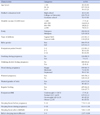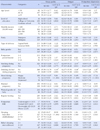Abstract
Purpose
This study was correlation study to identify the factors influencing sleep quality, fatigue, and postnatal depression in mothers who have given birth during the past 6 months.
Methods
The study was conducted using a survey with questionnaires to 329 mothers who visited E University Medical Center, or three local clinics located in D city, between August and October 2013. Collected data were analyzed using the SPSS/WIN 20.0 program.
Results
Out of 329 subjects, 18.2% showed that they had mild postnatal depression whereas 24.3% had severe postnatal depression. Accordingly, 42.5% reported having postnatal depression. Postnatal depression had a significant correlation with sleep hours after childbirth (r=-.16, p=.003), spousal support (r=-.28, p<.001), sleep quality (r=-.35, p< .001), physical fatigue (r=.66, p<.001), psychological fatigue (r=.69, p<.001), and neurosensory fatigue (r=.56, p< .001). Factors influencing postnatal depression include psychological fatigue, sleep quality, number of child births, and neurosensory fatigue, and these accounted for 53% of postnatal depression.
Conclusion
Results indicate that factors influencing postnatal depression involve psychological fatigue, sleep quality, number of child births, and neurosensory fatigue. Therefore for nursing intervention for postpartum mothers, it is necessary to assess the level of depression, fatigue, and sleep quality, and to provide interventions to relieve depression.
Figures and Tables
Summary Statement
▪ What is already known about this topic?
Postpartum depression may be expressed for various reasons. Despite the higher prevalence of postpartum depression in Korea compared with other countries, nursing and health activities for management of depression in mothers after giving birth hare not satisfactory.
▪ What this paper adds?
The rate of postpartum depression was 42.5% in this study. Factors influencing postnatal depression include psychological fatigue, sleep quality, number of child births, and neurosensory fatigue.
▪ Implications for practice, education and/or policy
Considering the number of deliveries a woman has had, it is necessary for health care providers and special national institutes to assess the degree of depression of those mothers and to prepare assessment and intervention regarding fatigue and quality of life which influence postpartum depression.
References
1. Park WM, Min KJ. Text book of depressive disorders. Seoul: Sigma Press;2012. p. 295–300.
2. Halbreich U, Karkun S. Cross-cultural and social diversity of prevalence of postpartum depression and depressive symptoms. J Affect Disord. 2006; 91(2-3):97–111.

3. Stewart RC. Maternal depression and infant growth-a review of recent evidence. Matern Child Nutr. 2007; 3(2):94–107.
4. Avan B, Richter LM, Ramchandani PG, Norris SA, Stein A. Maternal postnatal depression and children's growth and behaviour during the early years of life: exploring the interaction between physical and mental health. Arch Dis Child. 2010; 95(9):690–695.

5. Wee KY, Skouteris H, Pier C, Richardson B, Milgrom J. Correlates of ante-and postnatal depression in fathers: A systematic review. J Affect Disord. 2011; 130(3):358–377.
6. Wolf AW, De Andraca I, Lozoff B. Maternal depression in three Latin American samples. Soc Psychiatry Psychiatr Epidemiol. 2002; 37(4):169–176.

7. Cho EJ. Subjective sleep quality in depressed and non-depressed mothers during the late postpartum period. Korean J Women Health Nurs. 2009; 15(2):108–120.

8. Bozoky I, Corwin EJ. Fatigue as a predictor of postpartum depression. J Obstet Gynecol Neonatal Nurs. 2002; 31(4):436–443.

9. Dennis CL, Ross L. Relationships among infant sleep patterns, maternal fatigue, and development of depressive symptomatology. Birth. 2005; 32(3):187–193.

10. Jung MH, Kim JI. A study on the relationship among prenatal emotional status, preparation for delivery, postpartum social support and postpartum blues. Korean J Women Health Nurs. 2005; 11(1):38–45.

11. Lancaster CA, Gold KJ, Flynn HA, Yoo H, Marcus SM, Davis MM. Risk factors for depressive symptoms during pregnancy: a systematic review. Am J Obstet Gynecol. 2010; 202(1):5–14.

12. Signal TL, Gander PH, Sangalli MR, Travier N, Firestone RT, Tuohy JF. Sleep duration and quality in healthy nulliparous and multiparous women across pregnancy and postpartum. Aust N Z J Obstet Gynaecol. 2007; 47(1):16–22.

13. Ford DE, Cooper-Patrick L. Sleep disturbances and mood disorders: An epidemiologic perspective. Depress Anxiety. 2001; 14(1):3–6.

14. Ross LE, Murray BJ, Steiner M. Sleep and perinatal mood disorders: A critical review. J Psychiatry Neurosci. 2005; 30(4):247–256.
15. Corwin EJ, Brownstead J, Barton N, Heckard S, Morin K. The impact of fatigue on the development of postpartum depression. J Obstet Gynecol Neonatal Nurs. 2005; 34(5):577–586.

16. Rychnovsky J, Hunter LP. The relationship between sleep characteristics and fatigue in healthy postpartum women. Womens Health Issues. 2009; 19(1):38–44.

17. Reeves N, Potempa K, Gallo A. Fatigue in early pregnancy: An exploratory study. J Nurse Midwifery. 1991; 36(5):303–309.

18. Snyder-Halpern R, Verran JA. Instrumentation to describe subjective sleep characteristics in healthy subjects. Res Nurs Health. 1987; 10(3):155–163.

19. Kim KS. The effect of preparatory audiovisual information with videotape influencing on sleep and anxiety of abdominal surgical patients. J Korean Acad Fundam Nurs. 1994; 1(1):19–36.
21. Song JE. A comparative study on the level of postpartum women's fatigue between rooming-in and non rooming-in groups. Korean J Women Health Nurs. 2001; 7(3):241–255.

22. Cox JL, Holden JM, Sagovsky R. Detection of postnatal depression Development of the 10-item edinburgh postnatal depression scale. Br J Psychiatry. 1987; 150:782–786.
23. Han K, Kim M, Park J. The edinburgh postnatal depression scale, Korean version: reliability and validity. J Korean Soc Biol Ther Psychiatry. 2004; 10(2):202–207.
24. Park JW. Study to development a scale of social support [dissertation]. Seoul: Yonsei University;1985.
25. Hedman C, Pohjasvaara T, Tolonen U, Suhonen-Malm AS, Myllyla VV. Effects of pregnancy on mother's sleep. Sleep Med. 2002; 3(1):37–42.

26. Kempler L, Sharpe L, Bartlett D. Sleep education during pregnancy for new mothers. BMC Pregnancy Childbirth. 2012; 12(1):155.

27. Choi SY, Gu HJ, Ryu EJ. Effects of fatigue and postpartum depression on maternal perceived quality of life (MAPP-QOL) in early postpartum mothers. Korean J Women Health Nurs. 2011; 17(2):118–125.

28. Song JE. Predictors of postpartum fatigue between early and late postpartum period in parturient women: divided by 3/4 weeks of postpartum period. Korean J Women Health Nurs. 2007; 13(4):299–309.

29. Centers for Disease Control and Prevention. Prevalence of self-reported postpartum depressive symptoms-17 states, 2004-2005. MMWR Morb Mortal Wkly Rep. 2008; 57(14):361–366.
30. Jang EJ. Psychosocial and obstetric factors associated with postpartum depressive symptoms [master's thesis]. Gyeongju: Dongguk University College of Medicine;2008.




 PDF
PDF ePub
ePub Citation
Citation Print
Print






 XML Download
XML Download